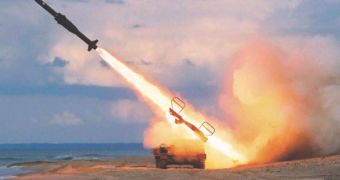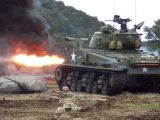The history and evolution of warfare has been linked to humans throughout our existence, ever since the chief of some tribe decided he wanted the territory and possessions of another tribe. Since then, records have been peppered with accounts of violent, large-scaled conflicts, involving tribesmen, mercenaries, and, later, national armies and small resistance groups.
As civilizations progressed worldwide, the Chinese, the Aztecs and the Babylonians all engaged in gruesome wars, for dominance over their territories and for capturing new ones. This implies that power is one of the main, underlying causes of violent conflicts throughout our history. It's in leaders' natures to seek even more control over the lives of their subjects, and that's one feature that hasn't changed at all over the millennia.
Even if now democracy is seen as people taking control of their own lives, we all know that this is not the case. Our representatives claim that they have the best interest of the community in mind, but money rules their world, as proven by the fact that only election cycles bring promises and, if we're lucky, a little bit of accomplishments on their part. Corruption would have gone extinct a long time ago if leaders had had the interest of the people in mind.
Now, consider aggression for a moment. It's one of our defining characteristics, and scientists have used it to differentiate humans from other species for a very long time. Recent studies proved that we are not the only species to kill our own kind, but the widespread opinion is still that we're the only ones to do it. Aggression is another cause for conflicts. Imagine what happened when a leader was offended by another leader in Ancient times. War was inevitable, as they took insults addressed to them personally as "mud" thrown to the entire city-state, settlement or empire.
Being unable to discern between the person of the sovereign and the state he ruled was the main justification for kings and emperors to drag their people to war. Ludvig XIV said it best – "I am the State." This phrase has numerous implications, the most important being that all the subjects he ruled were his by divine right. This granted French monarchs absolute power to run their country as they pleased. Maybe that's why their people revolted and installed democracy. But that's another discussion.
Back to the issue at hand, violent conflict can also be traced to economic interests, especially on the Old Continent. Consider the enormous empires that European countries such as Spain, Portugal and Great Britain built over the centuries. At one point, the sun never set on the British Empire, in that their colonies where literally spread throughout the world, in Southern China, Australia and Africa. The wars they fought to subjugate the nations living on those territories were thoroughly motivated by money.
The Empire needed spice and tobacco, as well as tea, to function. In its race for resources, it lost control of its most important possession, the American colonies. This loss weakened the entire empire, but not before it caused serious damage to native tribes throughout the world.
War lent a helping hand to human evolution
"The picture that was painted was quite consistent. Warfare has been with us for at least several tens, if not hundreds, of thousands of years. It has been a significant selection pressure on the human species," argues Mark Van Vugt, an evolutionary psychologist, working at the University of Kent, in the United Kingdom. He is talking about the fact that even the earliest remains of humans uncovered had marks consistent with those left behind by weapons, during a violent confrontation.
Anthropologists came up with an unusual explanation about why wars started all those thousands of years ago. They said that "cavemen" forming plans of attack and acting as one paved the way for people nowadays being able to work together for a common goal. This also applies to people working inside companies, where all "wheels must turn" in the same direction, in order for the "whole" to work properly.
Imagine, if you will, the level of coordination that proto-humans had to employ, in order to battle a rivaling tribe. Also, keep in mind that language had not yet appeared and that they mostly communicated through signs or indistinguishable syllables. Scientists say that their efforts virtually encoded the genomes of their offspring – namely, us – so that we would, one day, be able to take understanding each other for granted.
Spoken language made for an escalation in conflicts worldwide, as settlements grew and interests diverged even more. It was by this time that the first forms of diplomacy appeared. But, like today, words could only do so much. And it was Clausewitz who said that "War is merely a continuation of politics, but by other means." This was true throughout history, as countries, especially in recent times, resorted to conflicts when talks failed, and returned to the table when their interests no longer supported the continuation of their war efforts.
In prehistoric times, societies weren't nearly that complex. Tribes consisted of individuals, and each one played their part for the defense of the territory and the gathering of food. The only differentiations were based on gender and age. As agriculture developed, hunter-gatherer groups, comprised of humans who took active steps towards procuring food for themselves and the tribe, began attacking farmer communities. Historians believe that this time may have been the first display of organized warfare, as these attacks required planning ahead. Thus, tactics were born.
With populations increasing in various regions of the world, the ferocity of wars and the diversity of the tactics involved in warfare also became more complex, allowing the formation of professional armies, comprised of mercenaries that would fight for loot. In fact, say anthropologists, they were also fighting for power, as then, much like now, money were considered a sign of power.
Societal Development
War prompted the rise and fall of civilizations, say historians. And that is a well-known fact worldwide. To exemplify this, we can look at the Greek and Roman empires, which stretched as far as India, and all around the Mediterranean Sea respectively. And while the death of Alexander the Great brought the collapse of the former, it was relentless barbarian attacks that finally destroyed the latter. Thus, the "origin" of most modern inventions, such as roads, the Roman Empire, bowed its knowledge to hordes of savages, coming from the North. During its peak time, the Empire was a beacon of civilization, spreading its knowledge and culture to all its conquered provinces. But war changed all that, and forced their civilization into a steep decline.
In fact, most Ancient empires developed their own way of life, and their capitals became lighthouses in the area. Athena, Rome, Babylon, Constantinople and Jerusalem all served as major urban centers, and also played crucial parts in the defense of their territories. In those times, a country was defeated if their capital fell, so naturally all invaders focused on these cities. This prompted architects to build them to very impressive standards, which, in turn, attracted even more people and contributed to innovation and development.
Thus we could say that war was and still is one of the main contributors to scientific progress. That's not to say that war is good, but just remember all the improvements that your daily life benefits from, just after World War 2, including jet flight and an entire suite of medicine. Armies also benefited after European authoritarian regimes fell, as they received the key to building better bombs, rockets and machine guns.
Undoubtedly, over the years, more sophisticated weapons will prompt governments to develop even more complex defense systems, which will again place a strain on the scientific community, to come up with solutions. Think of all the "stealth" planes, satellites, "invisible submarines" and autonomous flying vehicles that are deployed on the battlefield today. And know that they are the result of thousands of years of continued fighting.

 14 DAY TRIAL //
14 DAY TRIAL // 

